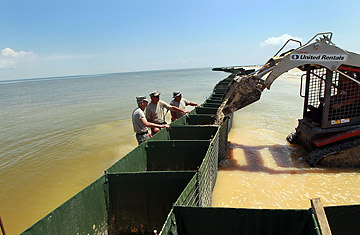
Alabama National Guard members work on erecting a HESCO container barrier in an effort to protect the coast line from the massive oil spill in the Gulf of Mexico on May 5, 2010 in Dauphin Island, Alabama.
The last few days on the Gulf of Mexico's coast have been waiting for a hurricane's arrival. Take it from the mayor of Dauphin Island, Alabama, Jeff Collier. Usually at this time of year, the high-rise condos, hotels and docks that line Collier's island, are bracing for the arrival of summer eco-tourists. Last week, however, tar the dimension of golf balls — possibly products of the oil spill — appeared on the island's white-sand beaches. Now, Dauphin Island (pop. 1,300) reflects the region's angst. Everyone, it seems, is worried about when the oil will make "landfall," a term typically reserved for hurricanes. "You're watching the oil's progression, keeping your fingers crossed that it won't come," Collier says.
The oil spill unraveling in the Gulf of Mexico has put cities and towns across the region on edge, even as officials scramble for solutions. The governor of Louisiana, Bobby Jindal, has proposed pumping sand into the Gulf to extend the Barrier Islands that have historically protected his state's coast. Florida's legislature may hold a special legislative session and consider a ban on drilling on the state's waters. Mississippi Gov. Haley Barbour says of the spill, "We're going to fight it every step of the way, and we do not take for granted that this is going to be catastrophic."
So far, Dauphin Island has been spared: Winds are expected to push the vast stretch of oil to the west, and away from the island. But that's tenuous. And it doesn't soothe nerves on Dauphin Island, a city of pink and blue condos about an hour's drive south of Mobile. It was once known as the "Atlantic City of the South." Tourism is Dauphin Island's biggest industry, and many visitors come to view the birds heading north. It's been called one of the country's "birdiest" cities. "So something like this oil spill threatens the environment," Collier says, "and it's a direct threat to our economy."
The protocol for dealing with hurricanes is well-established: Nail wooden boards over the windows and doors of homes. Stock up on canned goods. And, possibly, flee. But, says Collier, "We don't know about oil spills. That's the biggest concern — dealing with the unknown." The spill, of course, began with the April 20 explosion of the Transocean oilrig Deepwater Horizon. As oil moved closer to the coast, Collier, mayor for the last dozen years, oversaw the laying of thick lines of boom — basically, tubes intended to absorb oil in water, or corral it to be skimmed from the water's surface — in Mobile Bay. He ordered the construction of a four-foot-barrier on the island's south shore to deflect oil-infused water that might show up. Now, he wants to build a second, eight-foot-high barrier. But he's aware that might not work: Hurricane Katrina pushed nearly five feet of water into Collier's neighborhood, in the central part of the island.
On Monday afternoon, Michael and Lou Ann Edwards walked along the deck of the two-story vacation house they bought in 2005, just before hurricanes Ivan and Katrina. Now, they're concerned about the looming oil: Hurricane season begins June 1, and a fierce storm could push oil-infused water onto the land. Their property's value could be diminished. And already, hotels and condos have reported that up to 70% of reservations have canceled in recent days. "Used to be a great place to pick up speckled trout," Michael Edward said, looking out at a Pelican Bay. "But not anymore."
